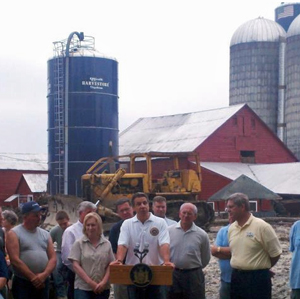With three of the nation’s top ten dairy states being impacted by major flooding resulting from the Hurricane Irene last week, the USDA is pledging support for affected producers.
“We continue to closely coordinate with many partners to meet the immediate and plan for the long-term needs of those affected by Hurricane Irene,” said Agriculture Secretary Tim Vilsack. “Our thoughts and prayers go out to all who have suffered losses caused by this massive storm. USDA is ready to provide food, emergency assistance and other resources to the affected areas.”
 On Saturday, Vilsack visited a New York dairy operation hit by flooding with Governor Andrew Cuomo, who pledged immediate aid of $15 million to New York farms devastated by flooding. USDA officials report that Hurricane Irene affected the ability of some dairy cooperatives and handlers in the Northeast to pick up milk at local farms particularly in Southern Vermont and Eastern New York.
On Saturday, Vilsack visited a New York dairy operation hit by flooding with Governor Andrew Cuomo, who pledged immediate aid of $15 million to New York farms devastated by flooding. USDA officials report that Hurricane Irene affected the ability of some dairy cooperatives and handlers in the Northeast to pick up milk at local farms particularly in Southern Vermont and Eastern New York.
In some instances milk was dumped on the farm when it was unable to be picked up on a timely basis or where loss of power impacted milk quality, rendering such milk as non-Grade A. Due to the impact of this natural disaster on dairy farmers in the Northeast, USDA is taking administrative action to include this milk as part of the Federal milk marketing order pool for the months of August and September as needed, although it was never delivered to a plant for processing. This decision will enable cooperatives and handlers to pay the Federal order blend price to affected producers on all the volume that they produced including any milk dumped due to Hurricane Irene.
USDA encourages all farmers, ranchers, producers, landowners and rural communities to contact their local USDA Farm Service Agency Service Center to report damages to crops or livestock loss.
Meanwhile, a measure has been introduced in Congress by members of the New York delegation to help farmers recover from losses incurred by Hurricane Irene. The Post-Irene Emergency Farm Aid Act would authorize $10 million to support the Emergency Conservation Program (ECP) and the Emergency Watershed Program (EWP) that provide emergency services and resources for agricultural communities following natural disasters.
